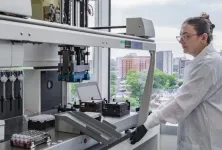(Press-News.org) UNIVERSITY PARK, Pa. — A novel neurotechnology treatment known as deep brain stimulation (DBS) can benefit patients with neurological disorders, but it involves surgical procedures with potential risks. Assessing the risk-benefit tradeoffs and the ethics in making decisions about whether to begin such treatments and when can be tricky for both patients and clinicians.
Laura Cabrera, associate professor of engineering science and mechanics, received a four-year, $1.5 million grant from the National Institutes of Health to research and develop a patient-centered decision aid to help guide patients, providers and caregivers navigating their options.
In a Q&A with Penn State News, Cabrera, who also is the Dorothy Foehr Huck and J. Lloyd Huck Chair in Neuroethics, a senior research associate in the Rock Ethics Institute and an associate professor of philosophy, discussed her plans for the research.
Q: What is deep brain stimulation, and what conditions does it treat?
Cabrera: DBS is a neurotechnology that involves the surgical implantation of an electrode or electrodes in the brain and the implantation of a pulse generator — sometimes called a “brain pacemaker” — under the patient’s clavicle or in the abdomen. The pulse generator, which controls the settings of the brain implant, such as voltage and frequency, is carefully programmed to deliver electrical impulses to specific targers in the brain to modulate brain activity.
DBS is currently approved for patients suffering from a variety of movement disorders, including Parkinson’s disease and essential tremor, as well as for patients with treatment-resistant obsessive compulsive disorder. There are a growing number of clinical trials to see if DBS can also help with other neurological and psychiatric conditions.
Q: What are the potential benefits or drawbacks for using the treatment early in a disease’s progression?
Cabrera: We know that different patients have different values and preferences regarding their health care; some will opt for an advanced neurotechnology early in the disease progression, while others will wait until they have exhausted other mechanisms. Potential benefits include reduced medication use and less surgical risks, which increase with age. Some studies claim even reduced costs to patients and the potential to be disease modifying. However, there also are important drawbacks, including the potential to be misdiagnosed and cumulative operative risks that come with living more years with implanted hardware. Early use of DBS has the possibility of increased life expectancy, which exposes patients to more disease complications not addressed by the intervention.
Q: What are some ethical concerns to consider when deciding whether or when to use neurotechnology?
Cabrera: Key ethical concerns are related to informed consent. The use of advanced neurotechnologies is a value-laden, preference-sensitive medical decision due to the complex trade-offs and burdens associated with them. Aside from costs, which might include surgery, devices, anesthesia, and hospital and physician fees, some additional decision-making considerations include quality of life, convenience, timing of intervention, limitations and changes in the activities of daily living, long-term outcomes, as well as additional decision-making considerations will be identified in this research. As such, having a mechanism to assess patients’ understanding of these considerations and alignment with expectations is key.
Q: How do you plan to help clinicians, patients and caregivers make decisions on whether to pursue advanced treatments involving neurotechnology?
Cabrera: A relevant approach to decision making is a process called shared decision making, in which physicians and patients arrive at a treatment plan together after considering patients’ individual values, preferences and goals. This process is enhanced by patient decision aids, which are used to support patient participation in the decision-making process and increase the likelihood of reaching a treatment decision that is not only clinically sound, but also in line with a patient’s values and preferences.
Through the course of this grant, we will develop a patient-centered decision aid to help patients and their clinicians engage in meaningful shared decision making around the early use of DBS for Parkinson’s disease. We hope that by having a tool that helps patients, caregivers and clinicians collaborate more effectively in the decision-making process, identifying the values and preferences each patient has regarding their health care needs, would allow them to identify the most appropriate time for a given patient to pursue this type of treatment.
The outcomes of this research can also help anticipate important future ethical issues and foster the responsible use of neurotechnologies early in the disease progression for a variety of brain related disorders.
Q: Who are the other collaborators on this grant and what professional experience do they bring?
Cabrera: Jennifer Blumenthal-Barby, a professor of medical ethics at Baylor University, has experience and expertise in neuroethics and developing decision aids, and was a member of the research team that updated the International Patient Decision Aid Standards framework and criteria in 2012. Sol De Jesus, assistant professor and associate vice chair for quality in the Penn State College of Medicine’s Neuroscience Institute, has focused on clinical translational work in patients with movement disorders. De Jesus leads the Penn State DBS clinic and utilizes DBS in her practice. Benjamin Levi, professor of pediatrics in the Penn State College of Medicine, has focused his bioethics research on the creation of creating online decisional tools.
END
Q&A: Ethical decision-making around neurotechnology treatments
Neuroethics expert Laura Cabrera discusses National Institutes of Health grant
2024-09-17
ELSE PRESS RELEASES FROM THIS DATE:
A smoother way to study ‘twistronics’
2024-09-17
A discovery six years ago took the condensed-matter physics world by storm: Ultra-thin carbon stacked in two slightly askew layers became a superconductor, and changing the twist angle between layers could toggle their electrical properties. The landmark 2018 paper describing “magic-angle graphene superlattices” launched a new field called “twistronics,” and the first author was then-MIT graduate student and recent Harvard Junior Fellow Yuan Cao.
Together with Harvard physicists Amir ...
UT Health San Antonio finds genetic risk-factor overlap between Alzheimer’s disease, and all-cause and vascular dementias
2024-09-17
SAN ANTONIO, Sept. 17, 2024 – In landmark research, scientists at The University of Texas Health Science Center at San Antonio (UT Health San Antonio) have reported the largest-ever genome-wide association study of dementia from all causes, revealing an overlap of genetic risks including neurodegeneration, vascular factors and cerebral small-vessel disease.
Genome-wide association studies help scientists identify genes associated with a particular disease or trait by exploring the entire set of DNA, or genome, of a ...
UM School of Medicine aims to accelerate basic science research and advance drug therapies with newly-created department
2024-09-17
University of Maryland School of Medicine (UMSOM) Dean Mark T. Gladwin, MD, has announced the formation of a new Department of Pharmacology, Physiology and Drug Development, which merges the Department of Physiology and Department of Pharmacology. This new Department aligns the basic science research efforts of both entities with a strong emphasis on the development of new drug therapies.
The Department will host three divisions spanning Cancer Therapeutics, Molecular Physiology, and Neuropharmacology, creating additional opportunities for research partnerships across current UMSOM Centers, ...
Can Google street view data improve public health?
2024-09-17
Big data and artificial intelligence are transforming how we think about health, from detecting diseases and spotting patterns to predicting outcomes and speeding up response times.
In a new study analyzing two million Google Street View images from New York City streets, a team of New York University researchers evaluated the utility of this digital data in informing public health decision-making. Their findings, published in the Proceedings of the National Academy of Sciences (PNAS), show how relying on street view images alone may lead ...
Mapping out matter’s building blocks in 3D
2024-09-17
NEWPORT NEWS, VA – Deep inside what we perceive as solid matter, the landscape is anything but stationary. The interior of the building blocks of the atom’s nucleus — particles called hadrons that a high school student would recognize as protons and neutrons — are made up of a seething mixture of interacting quarks and gluons, known collectively as partons.
A group of physicists has now come together to map out these partons and disentangle how they interact to form hadrons. Based at the U.S. Department of Energy’s Thomas Jefferson National Accelerator Facility and known as the HadStruc Collaboration, these ...
Cancer patients want financial screening early in care, study finds
2024-09-17
Patients want providers to reach out early and often to ask about financial needs
First study seeking cancer patient input on how they want to be screened
Findings show how to best deploy policies to screen cancer patients for financial concerns
CHICAGO --- Patients with cancer want their care team to assess them early in treatment about their concerns related to costs of care, reports a Northwestern Medicine study. It is the first time a study has sought cancer patients’ input on how they want to be screened for financial needs.
The financial impact of treatment, referred to as financial toxicity, includes direct costs, such as how much ...
Black women have a higher risk of dying from all types of breast cancer, meta-analysis reveals
2024-09-17
Breast cancer is the most diagnosed cancer among U.S. women and the second leading cause of cancer death. Black women who develop breast cancer are around 40% more likely to die of the disease than white women, but it was unclear until now whether this disparity exists across all types of breast cancer. Now, a meta-analysis led by Mass General Brigham researchers shows that Black women have a higher risk of dying from breast cancer for all tumor subtypes, and the size of this disparity varies from 17-50% depending on the type of breast cancer.
These findings, ...
‘Good complexity’ can make hospital networks more cybersecure
2024-09-17
In May, a major cyberattack disabled clinical operations for nearly a month at Ascension, a health care provider that includes 140 hospitals across the U.S. Investigators tracked the problem to malicious ransomware that had infected an employee’s computer.
Health care systems offer juicy targets for cybercrime because of the valuable personal, financial, and health data they hold. A 2023 survey of health information technology and IT security professionals reported that 88% of ...
Up to one-third of antibody drugs are nonspecific, study shows
2024-09-17
Integral Molecular, a leader in antibody discovery and characterization, has published new research in the journal mAbs, revealing that as many as one-third of antibody-based drugs exhibit nonspecific binding to unintended targets. A serious concern, off-target drug binding is a significant cause of adverse events in patients, with the potential to even cause death. Analysis of antibody off-target binding across different phases of clinical development suggests this to be a major cause of drug attrition. Early specificity testing could improve drug approvals and patient safety.
Learn how antibody developers can use the Membrane Proteome Array™ to assess specificity ...
Shrinking the pint can reduce beer sales by almost 10%
2024-09-17
Reducing the serving size for beer, lager and cider reduces the volume of those drinks consumed in pubs, bars and restaurants, and could be a useful alcohol control measure, according to research published September 17th in the open-access journal PLOS Medicine. Theresa Marteau and colleagues at the University of Cambridge, UK, found that over a short intervention period, venues that removed the pint and offered two third pints instead, sold 10% less beer by volume compared with when pints were available.
When wine by the glass is offered in smaller servings, the amount sold ...
LAST 30 PRESS RELEASES:
Exercise and nutritional drinks can reduce the need for care in dementia
Michelson Medical Research Foundation awards $750,000 to rising immunology leaders
SfN announces Early Career Policy Ambassadors Class of 2026
Spiritual practices strongly associated with reduced risk for hazardous alcohol and drug use
Novel vaccine protects against C. diff disease and recurrence
An “electrical” circadian clock balances growth between shoots and roots
Largest study of rare skin cancer in Mexican patients shows its more complex than previously thought
Colonists dredged away Sydney’s natural oyster reefs. Now science knows how best to restore them.
Joint and independent associations of gestational diabetes and depression with childhood obesity
Spirituality and harmful or hazardous alcohol and other drug use
New plastic material could solve energy storage challenge, researchers report
Mapping protein production in brain cells yields new insights for brain disease
Exposing a hidden anchor for HIV replication
Can Europe be climate-neutral by 2050? New monitor tracks the pace of the energy transition
Major heart attack study reveals ‘survival paradox’: Frail men at higher risk of death than women despite better treatment
Medicare patients get different stroke care depending on plan, analysis reveals
Polyploidy-induced senescence may drive aging, tissue repair, and cancer risk
Study shows that treating patients with lifestyle medicine may help reduce clinician burnout
Experimental and numerical framework for acoustic streaming prediction in mid-air phased arrays
Ancestral motif enables broad DNA binding by NIN, a master regulator of rhizobial symbiosis
Macrophage immune cells need constant reminders to retain memories of prior infections
Ultra-endurance running may accelerate aging and breakdown of red blood cells
Ancient mind-body practice proven to lower blood pressure in clinical trial
SwRI to create advanced Product Lifecycle Management system for the Air Force
Natural selection operates on multiple levels, comprehensive review of scientific studies shows
Developing a national research program on liquid metals for fusion
AI-powered ECG could help guide lifelong heart monitoring for patients with repaired tetralogy of fallot
Global shark bites return to average in 2025, with a smaller proportion in the United States
Millions are unaware of heart risks that don’t start in the heart
What freezing plants in blocks of ice can tell us about the future of Svalbard’s plant communities
[Press-News.org] Q&A: Ethical decision-making around neurotechnology treatmentsNeuroethics expert Laura Cabrera discusses National Institutes of Health grant





